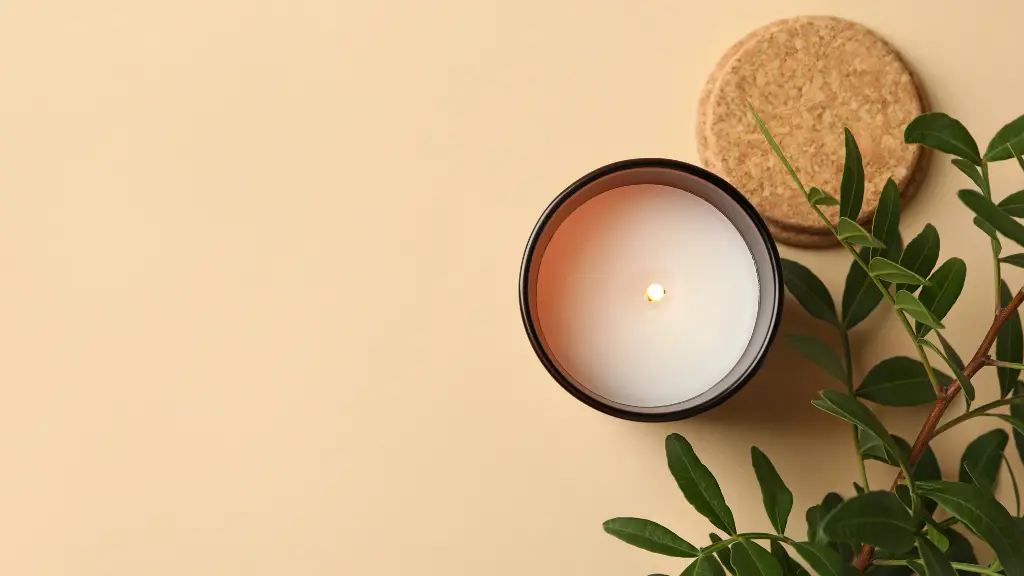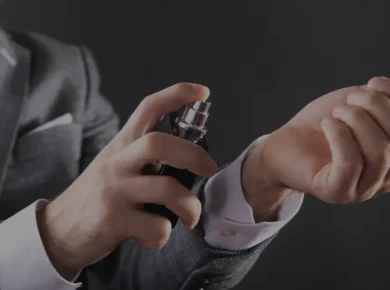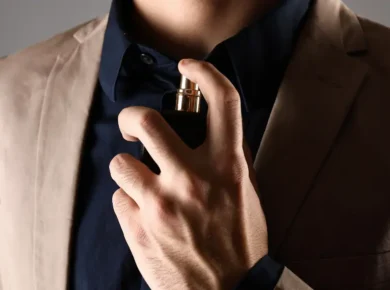As a devoted dog parent, I often think about pampering my furry friend with perfume. Americans are expected to spend over $150 million on pet products in 2024. This includes fragrances for our dogs. But, is it safe to use perfume on my dog? Let’s find out.
Dogs have a super strong sense of smell, with over 300 million sensory receptors in their noses. This is much more than humans, who have only 5 million receptors. While some fragrances might calm them, they can also mess with their natural scent communication. This could lead to stress, breathing problems, and skin issues.
Understanding Dog’s Natural Scent and Odors
Knowing about a dog’s natural scent is key when thinking about using perfumes or fragrances on them. Dogs have special glands all over their body. These glands are in their ears, paws, and anus. They produce secretions with unique smells. These smells are important for how dogs talk to each other and how they interact.
A dog’s sense of smell is incredibly sharp; they can detect half a teaspoon of sugar in an Olympic-sized swimming pool. This remarkable sensitivity highlights why introducing strong fragrances or products with toxic chemicals can be harmful.
Common Causes of Unpleasant Dog Odors
- Wet fur, which can lead to a musty or damp smell
- Bacteria on paws, which can create a “corn chip” aroma
- Natural body secretions, such as those from the anal glands
A dog’s natural body secretions, like those from the anal glands, make their scent unique. These secretions help dogs communicate and interact with each other. The American Kennel Club says dogs rolling in smelly things is an instinct. It’s likely linked to these natural odors.
Risks of Using Perfume on Dogs
Dogs have an incredibly sensitive sense of smell, making them highly susceptible to fragrances. While humans might enjoy the pleasant aroma of perfume, even a small amount can be overwhelming or stressful for dogs.
Potential Health Concerns
Perfume can be harmful to dogs in several ways. Even if you don’t realize it, certain ingredients in fragrances can affect a dog’s endocrine system, trigger allergic reactions, or lead to more serious conditions like cancer. Ingesting perfumes can also upset a dog’s stomach.
Strong smells can make breathing issues worse for dogs, and what seems pleasant to us might be overwhelming to them. Similar to how scented candles can be harmful to dogs, perfumes with intense fragrances can create an unhealthy environment for your pet.
Signs of Fragrance Sensitivity in Dogs
- Panting, yawning, or pacing, indicating stress or discomfort
- Visible signs of distress, such as trembling or hiding
- Skin irritation, redness, or itching
- Respiratory problems, such as coughing or sneezing
We need to think about our dogs’ special needs and how they might react to perfume. By choosing safe, natural options, we can keep our dogs healthy and happy.
Harmful Ingredients to Avoid in Pet Fragrances
When picking out pet fragrances, it’s important to watch out for synthetic ingredients and other harmful chemicals. These substances can pose risks to your dog’s health and well-being. Strong perfumes can irritate their skin, nose, and respiratory system, so it’s best to choose products with safe and clearly labeled ingredients. Prioritize your pet’s comfort and health by opting for subtle, odor-neutralizing scents.
Harmful Ingredients to Avoid:
- Phthalates: Can disrupt a dog’s endocrine system and cause hormone-related issues.
- Ethanol: May lead to skin irritation and toxicity if ingested or absorbed.
- Benzyl Acetate: Associated with respiratory problems and potential toxicity.
- Styrene: Known for harming the immune system and overall health.
- Benzyl Alcohol: Can cause skin irritation and toxic reactions.
To keep your pets safe, always check for IFRA (international fragrance association) certification and clear ingredient lists. Avoid products that use vague terms like “fragrance” or “perfume” without specifying ingredients. The purity and concentration of each component are key to ensuring your dog’s safety.
Avoid using the following essential oils around your pets:
- Cinnamon
- Eucalyptus
- Citrus
- Peppermint
- Tea Tree
To keep your furry friend healthy, stick to pet-safe alternatives. When evaluating fragrance products, consider their hazard scores, potential for allergies, and immunotoxicity. Always ensure the purity and safe concentration of all ingredients used in pet-safe fragrances.
Have cats at home? Check out the risks of plug-in air fresheners and how to keep your feline friends safe.
Are Plug-in Air Fresheners Safe for Cats? Risks & Safer Alternatives
Safe Alternatives to Traditional Perfumes
It’s best to avoid traditional perfumes on your dog. But, there are safe ways to keep them smelling fresh. Regular baths, brushing, and dental care help a lot. Also, choose grooming products that meet EMA and FDA standards.
1. Natural Deodorizing Options
Look for products that are IFRA-compliant and ECOGEA certified. These natural options remove bad smells safely. They don’t contain harmful chemicals found in some perfumes.
2. Veterinarian-Approved Products
Consult your veterinarian for guidance on safe fragrances for your dog. Vet-approved options often use natural ingredients and allergen-free formulations that are gentle on your pet’s skin and nose, ensuring they stay fresh without harmful side effects. Always check the product formulation to ensure it contains safe, transparent ingredients suitable for your pet’s well-being.
3. Professional Grooming Solutions
Professional groomers can also keep your dog smelling good. They use special products for your dog’s skin and coat. This leaves your pup looking and smelling great.
Proper Application Methods and Best Practices
When using scented products like shampoos, sprays, or perfumes on your dog, their safety and comfort should always come first. Fragrances, even natural ones, can cause irritation if not used carefully. Opt for allergen-free fragrances to minimize the risk of skin or respiratory reactions. To ensure safe application, follow these steps:Apply sparingly to your dog’s back and sides.
- Avoid sensitive areas like the face, eyes, ears, and genitals.
- Apply to your hands first, then gently massage it into your dog’s fur.
- Limit use to once a week or only when necessary.
- Monitor your dog for signs of discomfort or irritation.
- Wash off immediately if any adverse reactions occur.
By following these best practices, you can help keep your dog clean, comfortable, and smelling fresh without compromising their well-being.
Final Thoughts
Dogs should never have a strong “perfumed” scent. This can irritate their skin and nose. Fragrances should be subtle, only neutralizing odors. While using perfume on dogs is possible, their health and comfort are most important. Choose products with safe, transparent ingredients. Avoid frequent use to prevent masking potential health issues.
Regular grooming, combined with vet-approved fragrances, ensures your furry friend stays clean, happy, and healthy. This way, you can keep them well without compromising their well-being.









